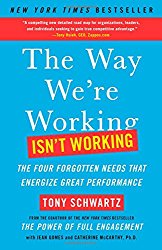The Ripple Effect
/One aspect of my professional life I don’t write about much on Free to Pursue, other than a vague hint of it here and there, is that my husband and I run a personal and small group physical training facility out of our home on a part-time basis. Since coming out of the FIRE writer closet in November 2016, despite some struggles in doing so, I see little reason not to offer some of the insights into successful living that I’ve gained from nearly a decade of experience as a personal trainer, especially having read my friend David's article on this very concept (thanks for the reminder David).
This article is the first of, I hope, a number of articles that leverage these learnings more openly. I hope you enjoy them as much as I enjoy writing them. If you find value and want to read more of this type of post, please let me know in the comments.
As a personal trainer and coach, I encounter many people who don’t feel great and want to:
“Building physical energy capacity is sometimes referred to as ‘toughening.’ In the largely sedentary world of white-collar workers, the absence of any regular physical demand precludes the natural toughening that occurs simply from a physically active life. The result is that as we age, most of us have less energy available to cope with challenging and stressful situations.”
- Look better
- Feel better
- Hurt less
- Get healthier
- Have more energy
If they choose to train with us, we collectively witness a steady physical transformation that consists of increased strength, power, stamina, cardiovascular conditioning, flexibility and other physical skills such as coordination, balance and agility. And we talk about this progress with clients, no question.
What We Don’t Talk About
The changes mentioned above also often cause a ripple effect.
At some point in the training, when someone is committed to doing the work to improve, a shift in thinking can happen. The shift in thinking moves from the mere physical toward overall performance. The athletes not only want more out of their physical training at our facility, but they also want more out of themselves and out of life.
The symptoms of this transformation in thinking exhibit themselves in various ways:
“Intense movement, balanced by deep recovery, dramatically increases our capacity, not just physically but also mentally and emotionally.”
- Some people stop worrying about dress size and body weight and start to focus on their newfound physical abilities as their measurement of choice
- Some individuals guard their time more closely and/or speak up more about what they want and need
- Some are visibly more resilient in dealing with adversity
- Some quit smoking or other habits they deem undesirable
- Others change their diet and/or question the continuation of drugs they're told they need to take, either reducing them or eliminating them altogether over time
- Others still act on professional or personal changes they’ve been wanting to do, sometimes for years
The Virality of Progress
“Our physical capacity is foundational, because every other source of energy depends on it.”
The common thread across these experiences is that the mental and physical strength developed in the gym permeates other aspects of life and the result is a generally happier, more positive and optimistic demeanor. Our clients become better versions of themselves.
“Pushing beyond our comfort zone is uncomfortable, but it’s the only means by which we can learn and grow, and ultimately perform better and experience deeper satisfaction.”
“Expanding capacity requires a willingness to endure short-term discomfort in the service of long-term reward.”
Getting ourselves to lift more, push more, demand more of ourselves expands our comfort zone and makes us question the value of making every activity “easier”—a value proposition so often pushed by marketers. We feel how amazing it is to experience personal discipline and the striving for more. We learn how striving for what is more difficult and scary is worth the effort and that avoiding it is akin to a missed opportunity.
The reward is almost always greater when the striving is harder. And that makes us want to conquer what's hard...first.
Moreover, the effects of training and sharing with others who are at various stages of this physical and psychological transformation can be infectious. The tide of positive change lifts all boats when there’s a feeling of community that develops thanks to a shared experience or pursuit (in person and/or online). This reality always brings to mind the saying that "you are the average of the five people you spend the most time with".
I may talk about reps, sets, bars & weights, form and function, but it’s never lost on me that part of my role as a trainer is to help others discover the power that lies within to expect more, both of themselves and out of life itself—on their terms and in their own time.
And when I witness evidence of it, both inside and outside the training environment, I find myself in awe.
It moves me beyond measure...and also makes me want to strive for more.
Image credit/copyright: zirconicusso / freedigitalphotos.net
This post contains affiliate links to amazon.com. Purchases made via these links help support the F2P blog. It doesn't cost you anything and helps cover ongoing expenses associated with maintaining this blog. Thank you for your support.





